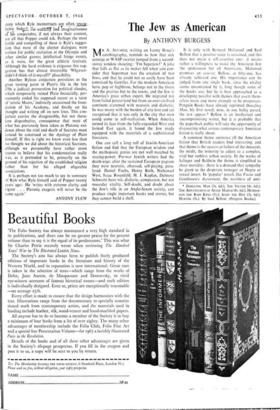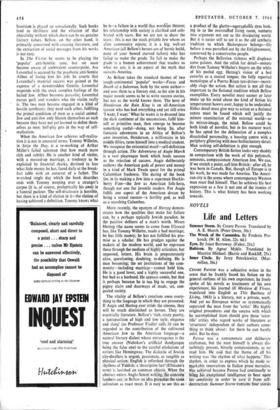The Jew as American
By ANTHONY BURGESS
MR A. ALVAREZ, writing on Lenny Bruce's autobiography, reminds us how that sick scourge or WASP-swatter jumped from a second- storey window shouting: 'I'm Superjew A joke that falls as flat as its maker fell when you con- sider that Superman was the creation of two Jews, and that he could not so easily have been contrived by Gentiles. For the modern American hero, pop or highbrow, belongs not to the rivers and the prairies but to the towns, and the Jew is America's great urban expert. He migrated not from failed potato-land but from an over-civilised continent crammed with neurosis and dialectic; he was weary with the burden of city-lore and yet recognised that it was only in the city that man could come to self-realisation. When America turned its face from the fully-expanded West and looked East again, it found the Jew ready equipped with the materials of a sophisticated literature.
One can call a long roll of Jewish-American fiction and find that the European wisdom and the mythopoeic genius are not well matched by staying-power. Pre-war Jewish writers had the death-urge; after the sustained European pogrom they were neurotic, obsessed, self-pitying, para- lysed. Daniel Fuchs, Henry Roth, Nathanael West, Isaac Rosenfeld, H. J. Kaplan, Delmore Schwartz have wit, dialectic, compassion, but not muscular vitality. Self-doubt, and doubt about the Jew's role in an Anglo-Saxon society, can produce single important books and stories, but they cannot build a shelf.
It is only with Bernard Malamud and Saul Bellow that a positive voice is sustained, and this does not mean a self-assertive one: it means rather a willingness to make the American Jew the spokesman for all Americans. Malamud promises an oeuvre; Bellow, at fifty-one, has already achieved one. His importance can be judged from any single book, since the vitality seems uncontained by it, long though some of the books are; but he is best approached as a developing novelist with themes that assert them- selves more and more strongly as he progresses. Penguin Books have already reprinted Dangling Man, his first novel; now, in one bulky parcel, the rest appear.* Bellow is an intellectual and uncompromising writer, but it is probable that the paperback public will take the opportunity of discovering what serious contemporary American fiction is really about.
A common theme animates all the American fiction that British readers find interesting, and that theme is the success or failure of the innocent, the misfit, the minority to adjust to a complex, vital but ruthless urban society. In the works of Salinger and Baldwin the theme is simplified to sheer morality: there is a demand that sympathy be given to the desperate teenager or Negro or sexual invert. In 'popular' novels like Focus and Gentlemen's Agreement, the nastiness of anti- * DANGLING MAN (3s. 6d.); THE Vicrna (4s. 6d.); Tim ADVENTURES OF AUGIE MARCH (8s. 6d.); HENDER- SON THE RAIN KING (5S.); SEIZE THE DAY (3S. 6d.); HERZOG (5S.). By Saul Bellow. (Penguin Books.)
Semitism is played up sensationally. Such books tend to shrillness and the vitiation of that objectivity without which there can be no genuine literary values. Bellow, on the other hand, is primarily concerned with creating literature, and the extraction of social messages from his works is not easy.
In The Victim he seems to be playing the 'popular' anti-Semitic tune, but we soon become aware of ambivalent counterpoint. Asa Leventhal is accused by the psychotic anti-Semite Allbee of losing him his job; he asserts that Leventhal's material success was gained at the expense of a downtrodden Gentile. Leventhal responds with the stock complex feelings of the baited Jew. Allbee becomes parasitic; Leventhal nurses guilt and wonders who the victim really is. The two men become engaged in a kind of hostile symbiosis; they need each other, fulfilling the primal condition of man as a social animal. Jew and anti-Jew only blazon themselves as such because they have not yet learned to define them- selves as men. Self-pity gets in the way of self- realisation.
When the American Jew achieves self-realisa- tion it is not in ancestral terms. Tommy Wilhelm, in Seize the Day, is a re-working of Arthur Miller's failed salesman (but how much more rich and subtle). He is another kind of victim, with a messed-up marriage, a tendency to be exploited by financial sharks, destined to lose what little money he has, faced daily at the break- fast table with an autocrat of a father. The wretched single day which the book describes ends with Tommy weeping over a stranger's corpse (it is, of course, proleptically his own) in a funeral parlour. The self-disclosure is horrible, but there is a kind of elation in it—the elation of having achieved a definition. Tommy knows what he is—a failure in a world that worships success; his relationship with society is clarified and cele- brated with tears. But we are not to share the tears : this is not the stock pitiable Jew whom an alien community rejects; it is a big, well-set American (all Bellow's heroes are of heroic build, none of your bowed starved tailors) who has failed to make the grade. To fail to make the grade is a human achievement that teaches us what we are; it is an aspect of the myth that sustains America.
As Bellow takes the standard themes of two tough-sentimental 'popular' works—Focus and Death of a Salesman, both by the same author— and uses them to a literary end, so his aim in his major novels seems to be to write success stories, but not as the world knows them. The hero of Henderson the Rain King is an all-American tycoon who has had everything and yet still cries 'I want, I want.' What he wants is to descend into the dark continent of the unconscious, fulfil him- self as primitive man, then emerge to become something useful—doing, not being. So, after fantastic adventures in an Africa of Bellow's own invention, Henderson, a millionaire in his middle fifties, turns himself into a medical student. We recognise the existential motif—self-definition through action. The Adventures of Augie March is a vast picaresque book which lauds success as the rejection of success. Augie deliberately eschews the American gods of power and money in a kind of Mark Twain quest for the primal Columbian freshness. The daring of the book lies in its making a Jew into a superman Huckle- berry Finn—the Jew as American folk-hero, though not one for juvenile readers. For Augie fulfils one aspect of the American dream by being a sexual success—a fertility god, as well as a searching Columbus.
More recently, the eponym of Herzog demon- strates how the qualities that make for failure can, by a perhaps typically Jewish paradox, be the positive definers of a man's worth. Moses Herzog (the name seems to come from Ulysses) has, like Tommy Wilhelm, made a bad marriage; he has little money; he has not fulfilled his pro- mise as a scholar. He has grudges against the makers of the modern world, and he expresses these through the medium of highly articulate, but unposted, letters. His brain is preposterously alive, questioning, doubting, re-defining. He is man becoming; the set institutions of the com- munity—including marriage—cannot hold him. He is a good lover, and a highly successful one, but bad as a husband. He appears comic, but that is perhaps because he is too big to engage the pigmy stairs and doorways of made, set, con- gealed society.
The vitality of Bellow's creations owes every- thing to the language in which they are presented. If Augie and Herzog ever stride the cinema, they will be much diminished as heroes. They are essentially literature. Bellow's 'rich, crazy poetry, a juxtaposition of high and low style, elegance and slang' (so Professor Fiedler calls it) can be regarded as the contribution of the cultivated American Jew to the American language—a natural literary dialect whose extravagance is the true answer (Nabokov's artificial dandyesque being the false one) to the careful etiolations of writers like Hemingway. The dialectic of Jewish city-dwellers is urgent, passionate, as tangible as physical action; English is refreshed through the rhythms of Yiddish; a 'descriptive lust' (Ellmann's term) is lavished on common objects.. When the abstract enters Anglo-Saxon writing ,,the (:•ncret,e lumbers out; in Bellow an idea provokes the same salivation as roast meat. It is easy to see this as-1 a product of the ghetto--agoraphohic eyes look- ing in to the overstuffed living room, ventures into argument not out to the dissipating world. But it is easier still to see it as the old synthetic tradition to which Shakespeare belongs—life before it was parcelled out by the Enlightenment, conserved by a conservative people.
Perhaps the Bellovian richness will displease some palates. And the relish for detail—minute dirt from Tommy Wilhelm's fingers on the white of his peeled egg; Herzog's vision of a bed coverlet as a coated tongue; the fully reported monologue of a Puerto Rican taxi-driver—inevit- ably clogs the action. But action is not all that important to the fictional tradition which Bellow exemplifies. Every novelist must sooner or later make up his mind about the kind of fiction his temperament hovers over, happy to be undecided. Either detail must give way to action or a fictional centre must be found which will justify the minute examination of the external world—or its mirror-image, the mind. Bellow could be both kinds of novelist, but in his maturer work he has opted for the delineation of a complex dissatisfied personality, a heaving centre with a periphery glittering with near-hallucinatory detail. Man seeking self-definition is plot enough.
Contemporary British fiction looks very shoddy in comparison with the work of this polymath, sensuous, compassionate American Jew. We can, if we stretch a point, call him British : after all, he was born in Canada. But, though all Europe is in his work, he was made for America. The Ameri- can city is the arena where contemporary Western man must find himself. That he achieves his best expression as a Jew is not one of the ironies of history. This is what history has been working towards.



































 Previous page
Previous page